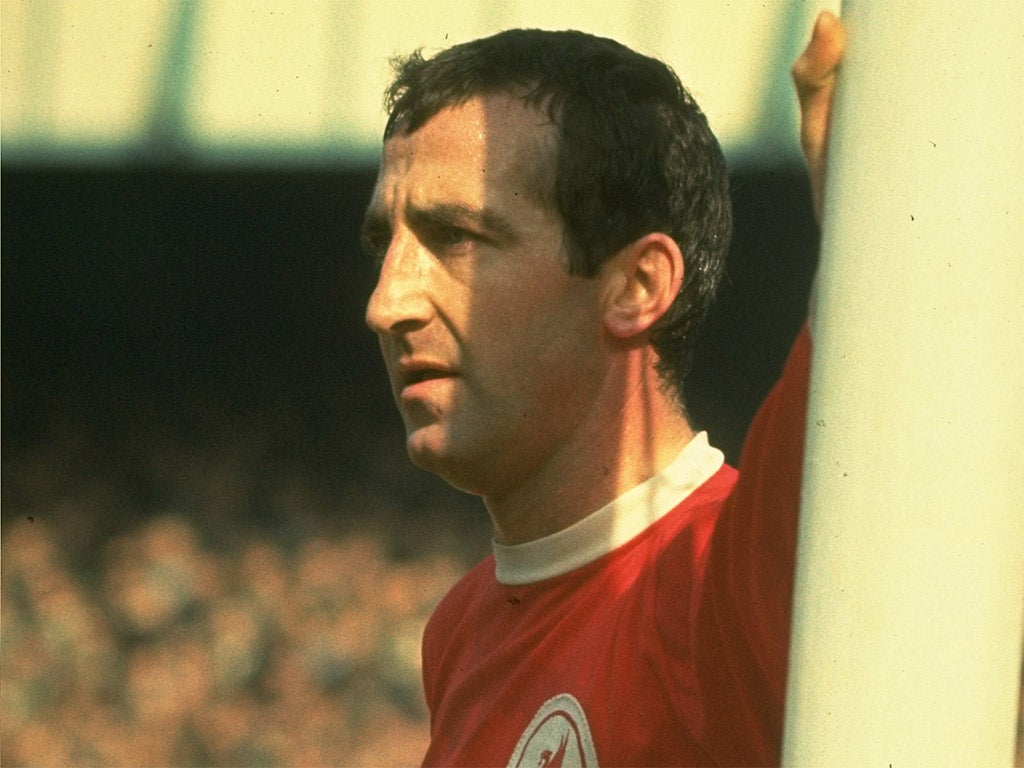Gerry Byrne: Tough, skilful, full-back whose finest moment was playing most of the 1965 FA Cup final with a broken collarbone
The Liverpool and England full-back was a cool, well-balanced operator, who redefined the boundaries of sporting bravery

Footballers don't come any tougher than Gerry Byrne. The Liverpool and England full-back redefined the boundaries of sporting bravery by playing for 117 minutes in the 1965 FA Cup final with the jagged ends of his broken collarbone grinding together. Byrne had been injured in a third-minute collision with the Leeds United captain Bobby Collins and his condition had been diagnosed instantly by the Reds' trainer, Bob Paisley. However, in the era before substitutes were allowed, Byrne refused to leave the pitch, deciding to disguise his plight from Don Revie's Yorkshiremen, who would certainly have taken advantage of the disability had they known about it.
Stretching the comic-book fiction scenario still further, the stricken defender took an active part in the ensuing action, effectively subduing Leeds' lively danger-man Johnny Giles and sprinting down the left wing to deliver a perfect cross for Roger Hunt to head the game's opening goal. Byrne's agony was extended by Billy Bremner's equaliser before Ian St John sealed the Merseysiders' first FA Cup triumph deep into extra time, with the wounded hero remaining on the field until the final whistle.
Although it was an episode which came to define the career of the muscular, swarthy Liverpudlian, he was no mere one-dimensional performer. Rather he was a cool, well-balanced operator, skilful and intelligent enough to compensate for a lack of extreme pace – and he was very, very hard.
Indeed, Tommy Smith, himself a physically intimidating figure renowned as "The Anfield Iron", tells the story of how once he flicked the ball between Byrne's legs on the way to netting a goal in training. A few minutes later the two men challenged for a bouncing ball and Smith found himself on the ground, covered in blood from a cut eye. Manager Bill Shankly looked down at him and grated: "Lesson No 1 – never nutmeg Gerry Byrne and think you can get away with it"
Discovered playing for Liverpool Catholic Schoolboys at 15, Byrne turned professional at Anfield two years later in August 1955, then endured a traumatic senior debut, conceding an own goal as the second-tier Reds were trounced 5-1 at Charlton in September 1957. Thereafter he appeared to be drifting hopelessly out of contention and was placed on the transfer list, but salvation was at hand in the form of Shankly. When the new manager strode confidently into Anfield late in 1959, he saw something in Byrne that had escaped everybody else, transforming the quiet local boy, something of a loner, from a reserve-team plodder into one of the most accomplished full-backs in the country.
Luck did play its part, with senior left-back Ronnie Moran suffering a serious injury in autumn 1960, enabling Byrne to take his place. Thereafter he flourished, switching to the right flank at the expense of Dick White when Moran was fit again, not missing a game as Liverpool romped away with the Second Division championship of 1961-62.
He remained a granite pillar of loyal reliability as Shankly's exhilarating side lifted the League title of 1963-64, and his efforts in the 3-0 European Cup victory over Anderlecht at Anfield the following December was described by Shankly – admittedly no stranger to hyperbole – as "the best full-back display Europe has ever seen."
Byrne, who had returned to the left when young Chris Lawler had replaced the veteran Moran that September, remained immensely influential as the Reds were crowned champions again in 1965-66 and he played in the Hampden Park final of that season's European Cup-Winners' Cup, lost to Borussia Dortmund through a fluke goal.
Due to the seamless excellence of Everton's Ray Wilson, Byrne was limited to only two England caps, the first when he was given the runaround by Scottish winger Willie Henderson in 1963, the second in the run-up to the 1966 World Cup, which Alf Ramsey's men won on home soil. However, he was a member of the victorious squad, receiving belated recognition, along with others who weren't picked for the final, when he was presented with a winner's medal in 2009.
Byrne's total of 333 senior appearances for Liverpool would have been considerably larger but for damage to a knee sustained in a home League clash with Leicester City on the opening day of 1966-67 shortly before his 28th birthday. After that he made strenuous efforts to make a full recovery but was never the same again and in 1969 he retired as a player, going on to coach briefly at Anfield. Shankly was all too aware of what he had lost, saying of the man he described as his club's supreme professional: "When Gerry went, it took a big chunk out of Liverpool. After that, something special was missing."
Gerald Byrne, footballer: born Liverpool 29 August 1938; played for Liverpool 1957-69; capped twice by England 1963-66; died Wrexham, Clwyd 28 November 2015.
Join our commenting forum
Join thought-provoking conversations, follow other Independent readers and see their replies
Comments
Bookmark popover
Removed from bookmarks